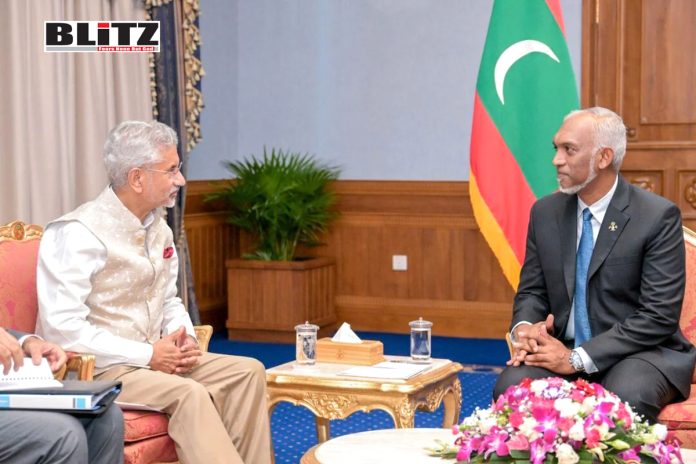India strengthens ties with the Maldives
India’s efforts to solidify its influence in the Indian Ocean region have taken a strategic turn with its renewed commitment to train 1,000 Maldivian civil servants by 2029. This initiative, which was initially launched in 2019, has been rejuvenated following a request from Malé during the recent visit of Indian Foreign Minister Subrahmanyam Jaishankar. The program’s renewal highlights India’s persistent endeavor to maintain strong relations with the Maldives, despite the diplomatic hurdles posed by the election of the ‘pro-China’ President Mohamed Muizzu.
The training program, facilitated by India’s National Center for Good Governance (NCGG), is part of a broader capacity-building initiative targeting government employees across Southeast Asia and Africa. Since its inception, the NCGG has successfully trained 1,000 Maldivian civil servants, enhancing their administrative and governance skills. The extension of this program for another five years underscores the importance New Delhi places on its relationship with the Maldives, a country of strategic significance in the Indian Ocean.
The NCGG’s role extends beyond the Maldives, with its training programs benefiting civil servants in countries such as Bangladesh, Tanzania, Gambia, Sri Lanka, and Cambodia. The comprehensive nature of these programs not only improves the governance capabilities of the participating nations but also strengthens India’s diplomatic ties with these countries. By offering such training, India positions itself as a key partner in the development of public administration in these regions, thereby enhancing its influence.
The Maldives’ strategic location in the Indian Ocean makes it a focal point in the geopolitical dynamics of the region. Over the years, India has recognized the importance of maintaining close ties with the Maldives, which serves as a crucial maritime neighbor. The Indian Ocean region is a vital corridor for international trade and energy routes, making the Maldives a significant player in regional security and stability.
India’s investments in the Maldives, amounting to approximately $220 million in recent years, reflect the country’s commitment to regional development and stability. These investments span various sectors, including infrastructure, health, and education, all of which contribute to the overall growth and development of the Maldives. By focusing on such developmental projects, India aims to create a positive image and foster goodwill among the Maldivian population, thereby countering any negative perceptions fueled by the pro-China stance of the current Maldivian leadership.
The relationship between India and the Maldives has faced challenges since the election of President Mohamed Muizzu in November 2023. Muizzu’s administration, perceived as having a pro-China tilt, has introduced a new dynamic in India-Maldives relations. One of the first actions taken by President Muizzu upon assuming office was to request the withdrawal of Indian troops stationed in the Maldives. These troops, numbering a few dozen, were primarily responsible for operating a Dornier aircraft and two helicopters provided by India for medical evacuations.
This request marked a significant departure from the policies of the previous administration led by President Ibu Solih, who had maintained closer ties with India. The withdrawal of Indian troops, though small in number, has symbolic implications, potentially signaling a shift in the Maldives’ foreign policy towards a more balanced or even China-leaning approach.
Despite these tensions, diplomatic channels between the two nations have remained open. President Muizzu attended Indian Prime Minister Narendra Modi’s swearing-in ceremony in June 2024, indicating a willingness to maintain cordial relations. However, the underlying tensions cannot be ignored, as they could influence the future trajectory of India-Maldives relations.
In response to these challenges, India has adopted a multi-pronged approach to maintain and strengthen its ties with the Maldives. The renewal of the civil servant training program is one such measure aimed at reinforcing bilateral relations. Additionally, during his visit to the Maldives, Foreign Minister Jaishankar inaugurated several infrastructure projects in Addu City, signaling India’s continued commitment to the Maldives’ development.
These projects, initially announced during the previous Maldivian government, are part of India’s broader strategy to enhance its soft power in the region. By investing in critical infrastructure, India not only contributes to the Maldives’ economic growth but also solidifies its presence in the country, making it more difficult for external powers, such as China, to gain a foothold.
Furthermore, the introduction of India’s real-time payment system, UPI, and the use of RuPay cards in the Maldives represent another dimension of India’s strategic outreach. These financial initiatives are designed to facilitate economic transactions between the two countries, particularly benefiting Indian tourists who form a significant portion of the Maldives’ tourism sector. By making it easier for Indian tourists to conduct transactions in the Maldives, India aims to boost tourism and, in turn, strengthen economic ties.
The relationship between India and the Maldives is at a critical juncture. The presence of a pro-China leader in Malé presents challenges to India’s strategic interests in the region. However, India has demonstrated resilience and adaptability in its foreign policy, focusing on long-term relationship-building measures, such as the civil servant training program and infrastructure investments.
The Maldives’ geopolitical importance cannot be overstated. As a small island nation, it may not possess significant military or economic power, but its location in the Indian Ocean makes it a valuable ally for any major power with interests in the region. India, with its longstanding historical and cultural ties to the Maldives, is well-positioned to maintain its influence, provided it continues to engage in proactive and constructive diplomacy.
India’s renewed commitment to training Maldivian civil servants is a testament to its strategic foresight and dedication to maintaining strong ties with its neighbors. While challenges persist, particularly with the current Maldivian leadership’s leanings towards China, India’s multifaceted approach, combining capacity-building, economic investments, and diplomatic engagement, offers a pathway to sustained influence in the Maldives. As the Indian Ocean region continues to be a theater of geopolitical competition, India’s relationship with the Maldives will remain a key factor in its broader regional strategy.
Please follow Blitz on Google News Channel

